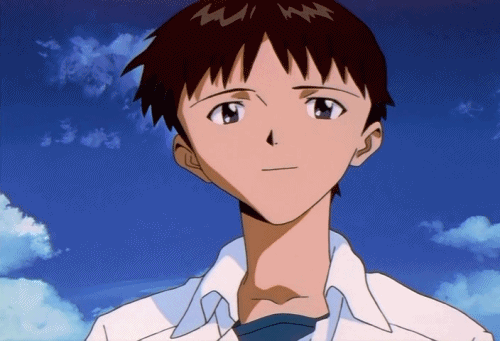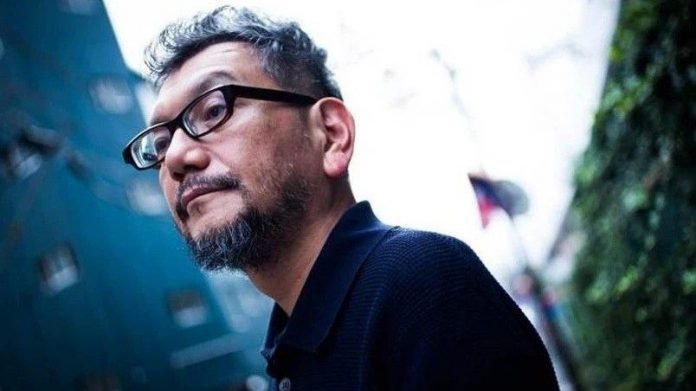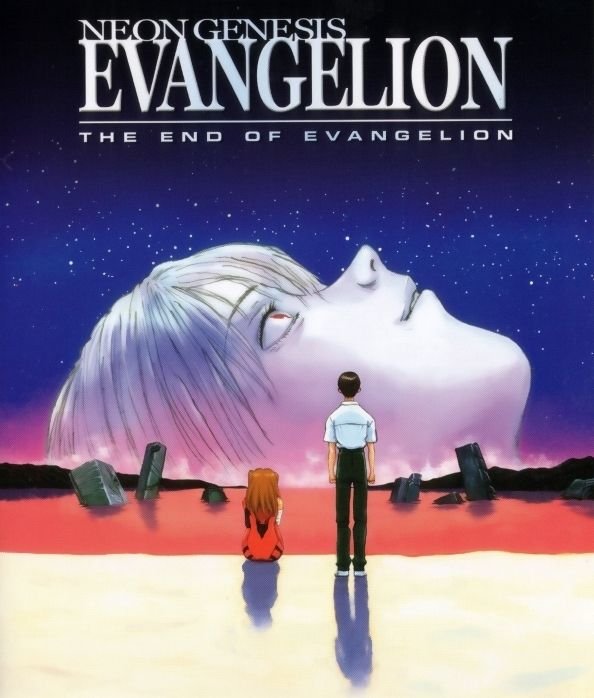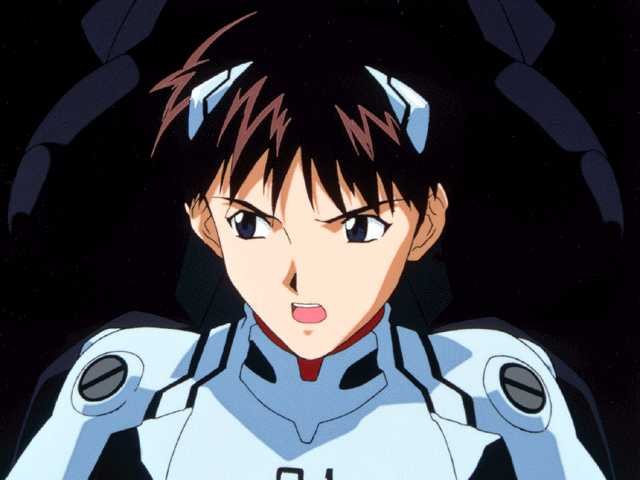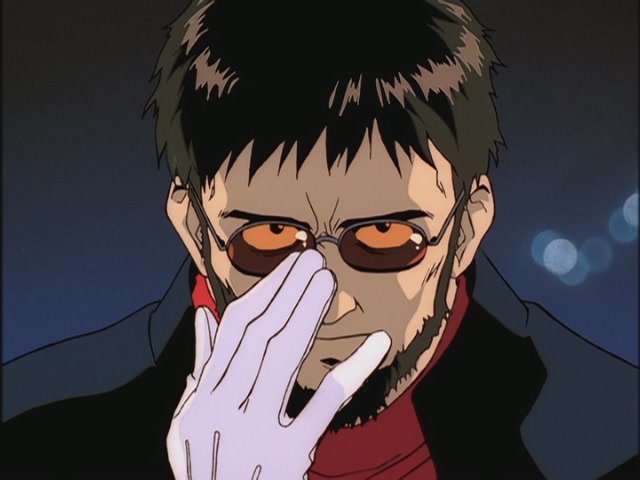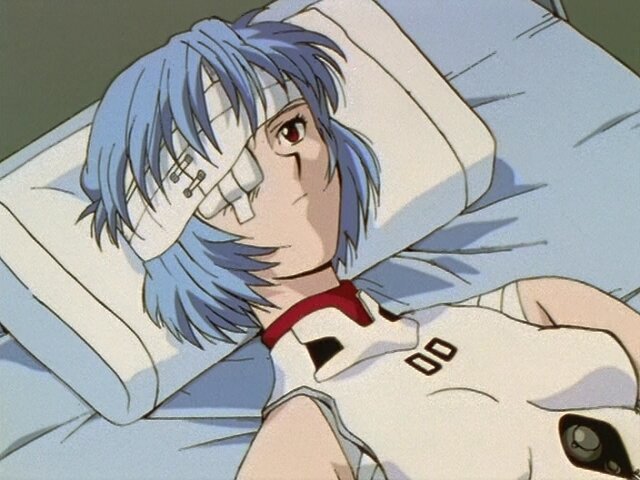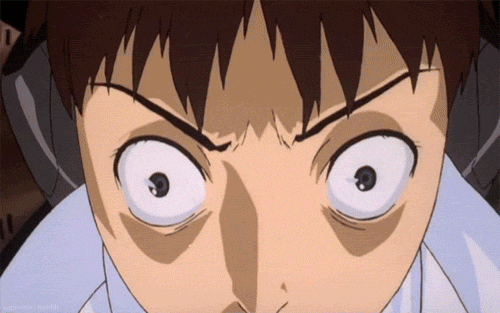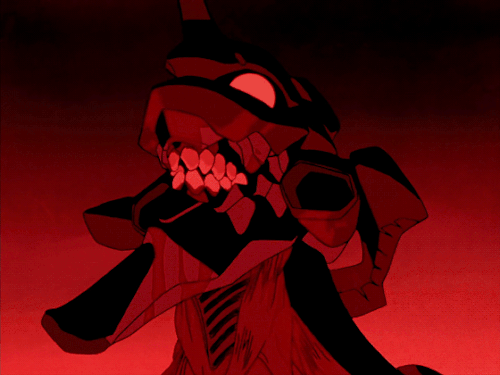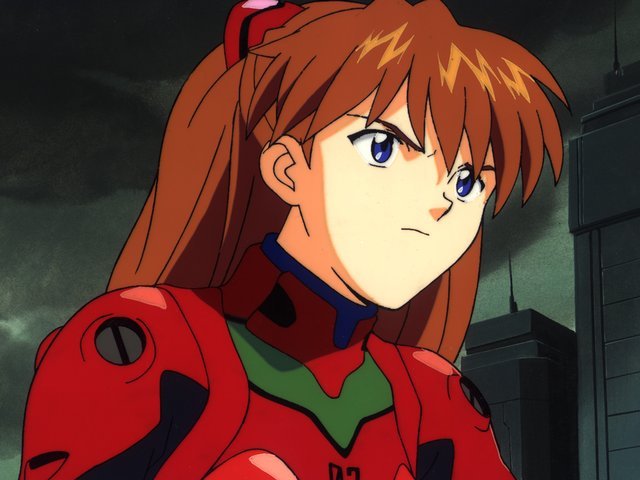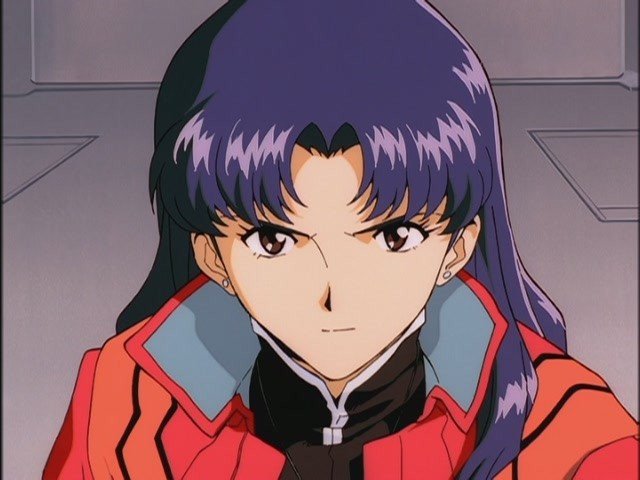English | Inglés
Greetings, Hive!
I have a couple of minutes (or rather hours) stuck in finding the way to start this post. It's complicated because the work that concerns us today, Neon Genesis Evangelion, is nothing more and nothing less than one of the most influential series in the history of not only anime, but audiovisual entertainment in general. I think there are many ways to approach Evangelion, it can be from its complicated and almost unexplained mythology, from the history of its world, or, with a much more intimate perspective through its characters. Whichever way we decide to see Evangelion, there is no doubt that we are in front of a more than interesting work and which is so far for me, my favorite anime.
So without any further ado, let's start!
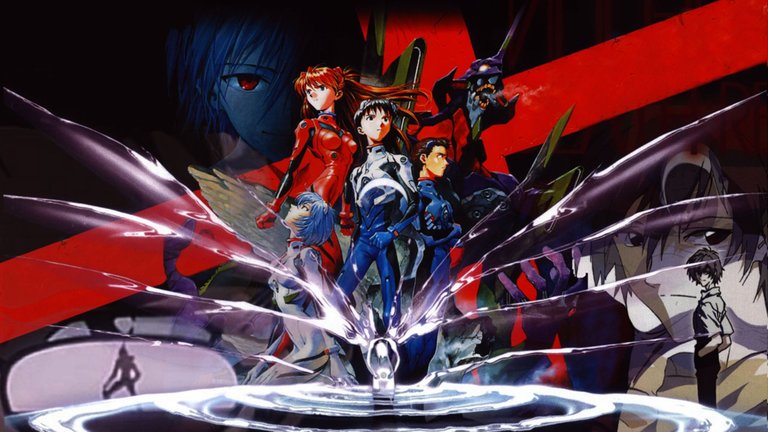

Neon Genesis Evangelion is an anime series produced by Gainax studio and directed by Hideaki Anno. Its transmission began on October 4, 1995 and concluded on March 27, 1996, with a total of 26 episodes. It is an anime of the mecha genre, it begins with a more or less common structure within what is usually seen in the shonen, however as the plot develops it becomes a psychological spiral in which the characters mental disorders take center stage, drastically changing the tone and development of the series. Its author, Hideaki Anno, confesses that this psychological approach was directly inspired by his own experience, since before starting the series production he had suffered from severe depression, reflecting this in the protagonist: Shinji Ikari.
This radical change in the tone of the series led to its budget being cut in its entirety before the end of its broadcast because what was being transmitted wasn’t what was agreed at the beginning of its development, so Hideaki Anno and his team had to improvise with episodes 25 and 26, making these a sensory bombardment through different psychological approaches that happened inside the mind of Shinji Ikari. Although this was initially a consequence of the budget cuts the team suffered, in the end it led to an unexpected success after which they were forced to culminate the series events with a movie called The End of Evangelion that was released on July 19, 1997, which although confusing, complements the events of the original series.
The story takes place in the year 2015, in a post-apocalyptic world in which half of humanity has been exterminated due to an event known as the Second Impact.
At the same time, humanity must defend itself from creatures they call Angels, for this task they created the Evangelion Units (abbreviated as EVA), biomechanical giants that are the only weapon of humanity capable of dealing with the angels. These EVA units can only be piloted by teenagers, and that's where our protagonist Shinji Ikari comes in.
Shinji is contacted by his father Gendo Ikari (who is the leader of NERV, the organization in charge of the defense against angels), to pilot the EVA-01 unit, at first Shinji refuses, however after his father manipulates him by telling him that if he doesn’t get on the EVA-01 unit, Rei Ayanami (a young girl of the same age and who he feels sorry for because she has serious injuries) would have to, he decides to get on the EVA-01 unit and face the angel that is besieging the earth. Despite this, Shinji is quickly knocked out but the Eva-01 begins to act on its own, destroying the angel in the process. This is the plot starting point.
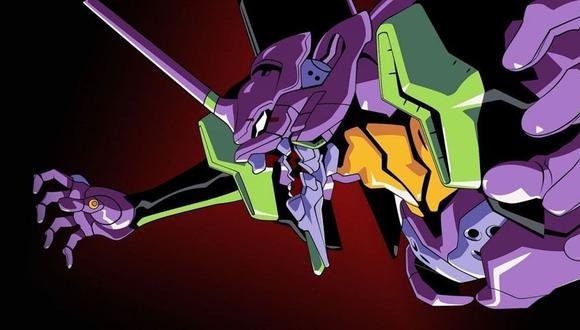

It is common to hear comments about the complexity Evangelion’s plot, and yes, I think that one if this anime sins is to saturate the viewer with events that are never properly explained, it feels like the series assumes that you already know its universe, its mythology and its rules, and although I’m not an expert on the subject, I think this can be called a writing problem.
However, from my perspective, there is a reason why Evangelion chooses not to tell you about its world.... This reason is that the angels, the post-apocalyptic world, the EVA units, the political crisis, all of that is an excuse to tell a story about feelings, specifically depression, and I think that leaving aside the need to understand in detail what is going on in the world of Evangelion, we can understand very easily what this story is trying to tell us; it is a journey through the most uncomfortable places in our psyche, those places we don't like to visit, where we feel fragile and vulnerable, it becomes uncomfortable because we resort to fiction to escape reality and not the other way around.
This is especially reflected in the collective hatred for our protagonist, Shinji Ikari. Shinji is a 14-year-old teenager whose mother died years ago and whom his father uses as a tool for which he doesn’t feel the slightest bit of affection, Shinji is broken inside because he has never felt the love of a family, he feels alone and unworthy of being loved, and on top of all that, against his will he is assigned the task of protecting a world that does not matter to him, however... Shinji decides to get on the EVA and defend humanity; one would expect that from there he would begin to develop as a character and begin to overcome his past traumas... But that isn’t the case. Every time Shinji gets on the Eva he ends up more broken than before, the only motivation he has to keep doing it is to feel useful to his father. He is criticized for crying, for doubting, for being sad, for being a coward, for being a very human and realistic character, it’s easy to hate Shinji because, in his shoes, any of us would be just like him, and that is the uncomfortable truth that Evangelion poses throughout its 26 episodes.
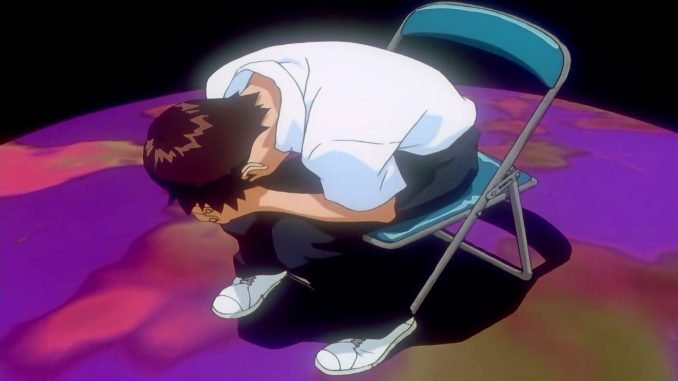
As I said before, little by little the series begins to deviate from its initial approach and goes into a dark territory of our minds. Each character lives a story, and not a love story, they are all broken inside because they are HUMANS living in a world that has taken everything from them, Shinji and Asuka's relationship goes from comic relief to a relationship of hatred and envy, we see how Misato's confident and full of sexuality attitude is nothing more than a facade to hide the need for male attention that her father never gave her. Further into the plot we see how Rei, the character most genuinely interested in Shinji is cruelly murdered, and furthermore, we are revealed that Rei is nothing more than a clone of Shinji's own mother.

Being all this said, it may seem that this is a story exclusively about pain... But it's not. Evangelion shatters all the expectations you have regarding a "common" overcoming story because real life isn’t like that, there is no power of friendship in real life, there is no magic that makes you feel good from one day to the next, depression is a mental illness that incapacitates those who suffer from it, the only way to overcome it is through professional help and a lot of hard work. The only way is to walk down that uncomfortable road and explore our feelings, understand them, accept them, accept that we are human and that we are imperfect, that not everything will always be under our control and that this is okay. The perfect representation about this happens in episodes 25 and 26, when we are made to dream of an alternate universe where life is perfect and no one suffers, this moment is almost magical because after the constant psychological bombardment we have received in the last stretch of the series what we need is something that makes us feel hope, but, is hope really the absence of pain? I don't think so. I think hope is having the ability to overcome ourselves, accept ourselves, understand ourselves, forgive ourselves in order to move on.
I think it was purely by chance, but I saw Neon Genesis Evangelion at a time in my life when I was feeling very bad, and it moved something inside me. It's hard to explain, but it was a set of feelings and sensations that resonated very strongly with my emotional situation at that moment, I could feel identified with its characters, their problems and their feelings, and that same situation I was going through clouded my vision as to the message that the series wants to give. Unfortunately, it made me cling to horrible feelings such as hopelessness, self-pity, sadness, not belonging feelings, feeling alone in such a big world, deserving of the things that were happening to me at that moment, however... As time passed by, and thanks to professional help and that of incredible people, I could begin to approach the whole situation from another point of view. It was then, when I understood that Evangelion is not a story of sadness, Evangelion is a story of hope, of overcoming, it is a very personal and necessary journey within our feelings. Its plot may often feel unnecessarily complicated, the rules and mythology of its universe may not be clearly explained, there may be a whole political conspiracy in its world, but for me, Alejandro Aldana, none of that is relevant in this story. What matters most to me is what it makes me feel, what it teaches me, and what it leaves me to think about.
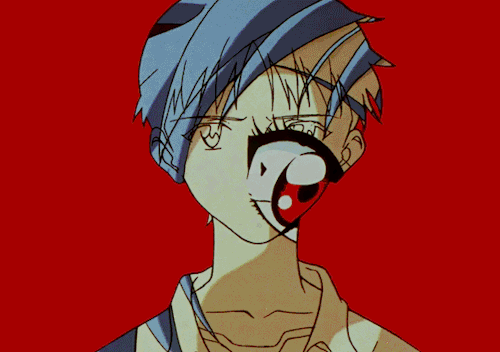

Español | Spanish
¡Saludos, Hive!
Tengo un par de minutos (u horas mejor dicho) atascado en encontrar la manera con la que comenzar con este post. Es complicado pues, la obra que nos atañe el día de hoy, Neon Genesis Evangelion, es nada más y nada menos que una de las series más influyentes en la historia no solo del anime, sino del entretenimiento audiovisual en general. Creo que hay muchas maneras de abordar a Evangelion, puede ser desde su complicada y casi inexplicada mitología, desde la historia de su mundo, o, con una perspectiva mucho más íntima a través de sus personajes. Sea cual sea la manera que decidamos ver a Evangelion, no cabe duda que estamos frente a una obra más que interesante y el que es para mí, hasta ahora, mi anime favorito.
Así que sin más preámbulos, ¡comencemos!


Neon Genesis Evangelion es una serie de anime producida por el estudio Gainax y dirigida por Hideaki Anno. Su transmisión comenzó el 4 de octubre de 1995 y concluyó el 27 de marzo de 1996 con un total de 26 episodios. Se trata de un anime del género mecha el cual comienza con una estructura más o menos común dentro de lo que es visto habitualmente en el shonen, sin embargo a medida que la trama se desarrolla esta va convirtiéndose en un espiral psicológico en el que los trastornos de los personajes toman el protagonismo, cambiando drásticamente el tono y desarrollo de la serie. Su autor, Hideaki Anno, confiesa que este enfoque psicológico fue inspirado directamente de su propia experiencia ya que antes de iniciar la producción de la serie había padecido de una grave depresión, plasmando esto en el protagonista de la obra: Shinji Ikari.
Este cambio radical en el tono de la serie llevo a que el presupuesto de la misma fuera recortado en su totalidad antes de terminar su emisión ya que lo que estaba siendo transmitido no era lo acordado al comienzo de su desarrollo, por lo que Hideaki Anno y su equipo tuvieron que improvisar con los episodios 25 y 26, haciendo de estos un bombardeo sensorial a través de distintos planteamientos psicológicos que sucedían dentro de la mente de Shinji Ikari. A pesar de que esto en primera instancia fue una consecuencia del recorte de presupuesto que sufrió el equipo, al final desembocó en un inesperado éxito tras el cual se vieron obligados a culminar con los eventos de la serie con una película llamada The End of Evangelion que fue estrenada el 19 de julio de 1997, que aunque confusa, complementa los acontecimientos de la serie original.
La historia toma lugar en el año 2015, en un mundo post-apocalíptico en el que la mitad de la humanidad ha sido exterminada debido a un acontecimiento conocido como el Segundo Impacto.
Al mismo tiempo la humanidad debe defenderse de unas criaturas a las que llaman Ángeles, para esta labor crearon las Unidades Evangelion (abreviados como EVA), unos gigantes biomecánicos que son el única arma de la humanidad capaz de hacerle frente a los ángeles. Estas unidades EVA solo pueden ser piloteadas por adolescentes, y es ahí donde entra nuestro protagonista Shinji Ikari.
Shinji es contactado por su padre Gendo Ikari (quién es dirigente de NERV, la organización a cargo de la defensa de los ángeles), para pilotear la unidad EVA-01, en primera instancia Shinji se niega, sin embargo después de que su padre le manipula con que si él no se sube tendrá que hacerlo Rei Ayanami (una joven de su misma edad y de la que se compadece porque tiene graves heridas), decide subirse a la unidad EVA-01 y enfrentar al ángel que está asediando la tierra. A pesar de esto, Shinji es dejado fuera de combate rápidamente pero el EVA-01 comienza a actuar por cuenta propia, destruyendo al ángel en el proceso. A partir de aquí comienza la trama de la serie.


Es común escuchar comentarios acerca de la complejidad de la trama de Evangelion, y es que sí, creo que en una de las cosas que peca este anime es en saturar al espectador con acontecimientos que nunca son debidamente explicados, se siente como que la serie asume que ya conoces su universo, su mitología y sus reglas, y aunque no soy un experto en el tema, creo que a esto se le puede llamar problema de escritura.
Sin embargo, desde mi perspectiva, existe una razón por la cual Evangelion decide no contarte acerca de su mundo… Esta razón es que los ángeles, el mundo post-apocalíptico, las unidades EVA, la crisis política, todo eso es una excusa para contar una historia acerca de los sentimientos, concretamente la depresión, y creo que dejando de lado la necesidad de entender con lujo de detalle lo que está pasando en el mundo de Evangelion, podemos entender muy fácilmente lo que esta historia trata de contarnos; es un viaje a través de los lugares más incomodos de nuestra psique, esos lugares que no nos gusta visitar, donde nos sentimos frágiles y vulnerables, se vuelve incómodo porque recurrimos a la ficción para escapar de la realidad y no al revés.
Esto se ve especialmente reflejado en el odio colectivo que hay hacia nuestro protagonista, Shinji Ikari. Shinji es un adolescente de 14 años cuya madre murió hace años y al que su padre usa como una herramienta por la cual no siente ni el más mínimo ápice de afecto, Shinji está roto por dentro porque nunca ha sentido el amor de una familia, se siente solo y no merecedor de ser amado, y encima de todo eso, contra su voluntad se le es asignada la labor de proteger un mundo que no le importa. Sin embargo… Shinji decide subirse al EVA y defender a la humanidad, se esperaría que a partir de ahí comience su desarrollo como personaje y que comience a superar los traumas de su pasado… Pero no es así. Cada vez que Shinji se sube al EVA termina más roto que la vez anterior, la única motivación que tiene para seguir haciéndolo es la de sentirse útil para su padre. Se le critica por llorar, por dudar, por entristecerse, por ser cobarde, por ser un personaje muy humano y realista, es fácil odiar a Shinji porque, en sus zapatos, cualquiera de nosotros sería igual a él, y esa es la verdad incómoda que Evangelion plantea a lo largo de sus 26 episodios.

Como dije con anterioridad, poco a poco la serie comienza a desviarse de su planteamiento inicial y se adentra en un territorio oscuro de nuestras mentes. Cada personaje vive una historia, y no una historia de amor, todos están rotos por dentro pero porque son HUMANOS viviendo en un mundo que les ha arrebatado todo, la relación de Shinji y Asuka pasa de ser un alivio cómico a ser una relación de odio y envidia, vemos como la actitud segura y llena de sexualidad de Misato no es más que una fachada para ocultar la necesidad de atención masculina que su padre nunca le dio. Avanzada la trama vemos como Rei, el personaje más genuinamente interesado en Shinji es cruelmente asesinado, y además, nos revelan que Rei no es más que un clon de la propia madre de Shinji.

Dicho todo esto puede parecer que esta es una historia exclusiva al dolor… Pero no. Evangelion destroza todas las expectativas que tengas con respecto a una historia “común” de superación porque la vida real no es así, en la vida real no existe el poder de la amistad, no existe ninguna magia que te haga sentirte bien de un día para otro, la depresión es una enfermedad mental que incapacita a quienes la padecen, la única manera de superarla es a través de ayuda profesional y muchísimo trabajo duro. La única manera es transitar por ese camino incómodo y explorar nuestros sentimientos, entenderlos, aceptarlos, aceptar que somos humanos y que somos imperfectos, que no todo estará siempre bajo nuestro control y que eso está bien. La representación perfecta de esto sucede en los episodios 25 y 26, cuando nos hacen soñar con un universo alterno donde la vida es perfecta y nadie sufre, este momento es casi mágico porque después del constante bombardeo psicológico que hemos recibido en el último tramo de la serie lo que necesitamos es algo que nos haga sentir esperanza, pero, ¿de verdad la esperanza es la ausencia de dolor? Creo que no. Creo que la esperanza es tener la capacidad para superarnos, aceptarnos, entendernos, perdonarnos, y seguir adelante.
Creo que fue por pura casualidad, pero vi Neon Genesis Evangelion en un momento de mi vida en el que me sentía muy mal, y este movió algo dentro de mí. Es difícil de explicar, pero fue un conjunto de sentimientos y sensaciones que resonaron muy fuerte con mi situación emocional en ese momento, podía sentirme identificado con sus personajes, sus problemas y su sentir, y esa misma situación por la que estaba pasando me nublo la vista en cuanto al mensaje que la serie quiere dar. Desafortunadamente, me hizo aferrarme a sentimientos horribles como la desesperanza, la autocompasión, la lástima, la tristeza, el no pertenecer, el sentirme solo en un mundo tan grande, merecedor de las cosas que en ese momento me estaban pasando, sin embargo… Con el paso del tiempo, y gracias a ayuda profesional y a la de personas increíbles, pude comenzar a abordar toda esa situación desde otra mirada. Fue entonces, cuando entendí que Evangelion no es una historia de tristeza, Evangelion es una historia de esperanza, de superación, es un viaje muy personal y necesario dentro de nuestros sentimientos. Puede que muchas veces su trama se sienta innecesariamente complicada, que no te expliquen con claridad las reglas y mitología de su universo, que haya toda una conspiración política en su mundo, pero para mí, Alejandro Aldana, nada de eso es relevante en esta historia. Lo que más me importa es lo que me hace sentir, lo que me enseña, y lo que deja en mí para pensar.


Talking about the things I'm passionate about in this community is something I really enjoy, I hope every person who reads this and any other of my posts enjoys it too. I also greatly enjoy reading your comments and opinions, so I would like to know what you think about Evangelion, if you like it, if you don't like it, if it confuses you, or if you just love it like me.
I would also like to point out that this is the last post of the Anime Blogging Challenge created by @kuronokenshi, thank you for creating such a great challenge and I hope many more people will continue to join in.
Hablar acerca de las cosas que me apasionan en esta comunidad es algo que disfruto muchísimo, espero que cada persona que lea esta y cualquier otra de mis publicaciones lo disfrute también. También disfruto enormemente leer sus comentarios y opiniones, por lo que me gustaría saber que piensan acerca de Evangelion, si les gusta, si no les gusta, si los confunde, o si simplemente lo aman como yo.
También quisiera resaltar que este es último post del Anime Blogging Challenge creado por @kuronokenshi, gracias por haber creado este challenge tan genial y espero que muchas más personas se sigan uniendo a él.

Post made for de Anime Blogging Challenge from @kuronokenshi | Post hecho siguiendo con el Anime Blogging Challenge propuesto por @kuronokenshi
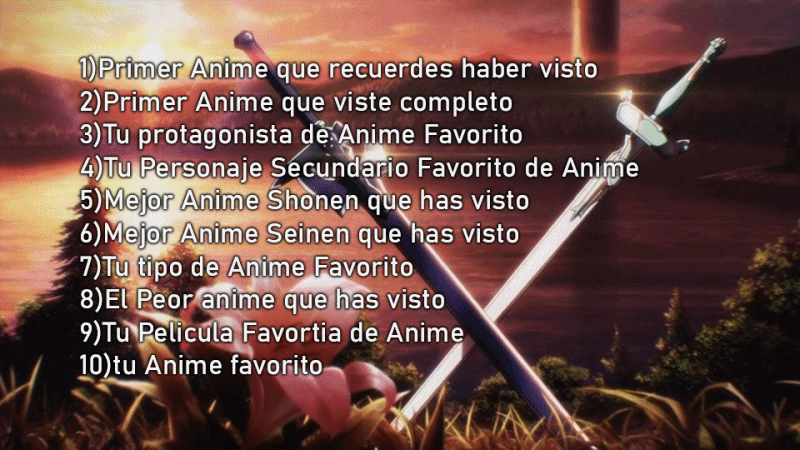
Previous entries | Participaciones anteriores
First anime I remember watching | Primer anime que recuerdo haber visto
First anime I watched in its entirety | Primer anime que vi completo
My favorite anime main character| Mi protagonista favorito del anime
My favorite anime supporting character | Mi personaje secundario favorito del anime
Best anime shonen I've ever seen | El mejor anime shonen que he visto
My favorite type of anime | Mi tipo de anime favorito
Thank you so much for reading me, see ya next post! | ¡Muchas gracias por leerme, nos vemos en el siguiente post!
